Students and faculty members harshly criticized University of Arizona President Robert C. Robbins on Thursday over a $240 million budget shortfall that has sparked suggestions for cuts to student scholarships and instructor salaries.
The angry complaints about the financial miscalculation consumed most of the first hour of a gathering of the board of regents in Tucson. News of the shortfall was announced two weeks ago and quickly led to calls for an external audit and accountability by university leadership.
“I do not trust the university with my well-being anymore," Megan Wong, a student senator in the pharmacy college, told the crowded meeting. "The university has made it loud and clear that they do not care about us.”
Phyllis Brodsky, of the university's office of instruction and assessment, told Robbins that news of the shortfall has created uncertainty as she prepares to retire next year.
“I did my job for 40 years," she told the university's president. "Now do yours!”
Robbins did not directly address the criticism during the meeting but acknowledged that the university faces financial difficulties. Robbins has until Dec. 15 to give the board of regents a plan for dealing with the shortfall.
Robbins has said that the university's athletic department drained university resources ahead of its move from the Pac-12 to the Big 12.
He acknowledged during a Nov. 2 meeting with the board of regents that athletics was not producing the revenue expected after the pandemic and has indicated that cutting sports from the school is an option. Arizona has 20 athletic teams and a budget that exceeds $100 million.
The meeting Thursday also featured a presentation by Robbins on key investments the university has made over the past year in research and other areas, using money drawn from the school's reserves.
Jon Laguardia, a lecturer in the English department, said he represented instructors in the school’s writing program who he said have a base annual salary of about $44,000 and deserve an increase.
“We make a lot of money for the university,” said Laguardia, noting that good writing skills are important in all academic disciplines.


